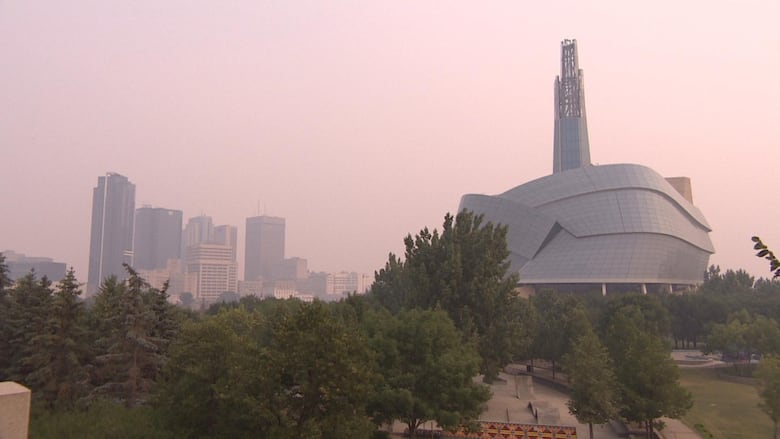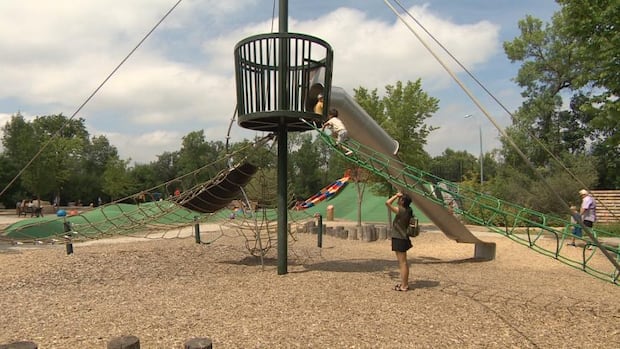Summer camps say they're ready to adjust as wildfire smoke looms large over Manitoba
'We're just trying to carry on as best as we can,' says director of nature-based learning at FortWhyte Alive

Some Winnipeg summer camps are taking precautions as potential health risks from the thick wildfire smoke cast a shadow over outdoor activities.
An Environment Canada weather warning remained in place for most of the province's north as well as parts of central Manitoba Monday afternoon.
Poor air quality and reduced visibility led to cancellations of events across the province this weekend, including in Winnipeg, where the air quality heath index was at six as of 2 p.m., indicating a moderate risk.
Summer camps in the city say they're working to adapt.
The Assiniboine Park Zoo said it's making masks available for staff and some of the 120 or so children who attend its day camp every week.
Jody Watson, senior director of programming and education with the Assiniboine Park Conservancy, said the organization had to put an air quality policy in place for its camp and other programs this summer because of the smoky conditions.
LISTEN | Province provides wildfire update amid smoky conditions:

"If we do have a day where the air quality is poor, we're going to modify our activities, we're going to try to spend more time inside," she said. "We've encouraged parents to provide masks for their kids."
Leah Smith, director of nature-based learning at FortWhyte Alive, said smoke hasn't affected activities at the nature centre's camp so far this summer, which is attended by about 150 children every week.
But she said that just like any other weather events, the centre has plans in place to adapt its programming to the smoky conditions.
"Indoor crafts. We've got lots of exhibits, we've got the touch museum.… We just kind of minimize our stints of time outside," Smith said.
"We're staying closer to the buildings, not going on big hikes, monitoring any of the children and staff for any adverse effects from exposure. And yeah, otherwise we're just trying to carry on as best as we can."
A City of Winnipeg spokesperson said in an email Monday most of its summer programs have access to indoor spaces, and that the city directs program leaders to spend more time inside or reduce the time spent on intense physical activity when smoke is particularly bad.
The University of Manitoba said all activities at its Mini-U summer camp are brought inside when the air quality health index hits a seven or greater, indicating a high or very high level of risk.
"When the air quality index is between 1-6, group leaders are asked to monitor how their participants are feeling and make a location change to an indoor activity, if needed," a university spokesperson said in an email.
"As per standard protocol for Mini-U, any outdoor activity is never scheduled for longer than two hours, even when air quality is fine."
People exposed to wildfire smoke may experience eye, nose and throat irritation, headaches or mild cough. More severe symptoms include wheezing, chest pains or severe cough.
More research needed on long-term effects: Professor
Dr. Chris Pascoe, an associate professor at the university, studies the effects of wildfire smoke on the body. He said there's still a lot of unknowns when it comes to the long-term health effects, but that risks include worsening symptoms in kids who have asthma.

Pascoe said there is also evidence of people becoming more susceptible to cold or infections because of wildfire smoke exposure.
"I'm constantly checking the air quality. I feel like it's been my part-time job this summer," he said.
"We know what the risk is for at-risk populations.… But kids are still growing, just developing, their brains and hearts are still maturing. And so, minimizing that risk is probably our best course of action until we have more information."
Pascoe said the shorter the exposure the better, and that parents should consider rescheduling outdoor activities or moving them indoors whenever possible. He said masks are always a option, but that they need to be well-fitting, which may be a challenge for young children.
Winnipeg parent Neil Hipolito said he's mindful of the risks when planning activities for his two children, but that he still wants them to make the most of the summer.
"We just check online information and see if there's any air quality warnings," he said. "If there's no signs of [smoke], we just make it [a] point that we go out outdoors because, you know, winter's coming soon."
With files from Gavin Axelrod


